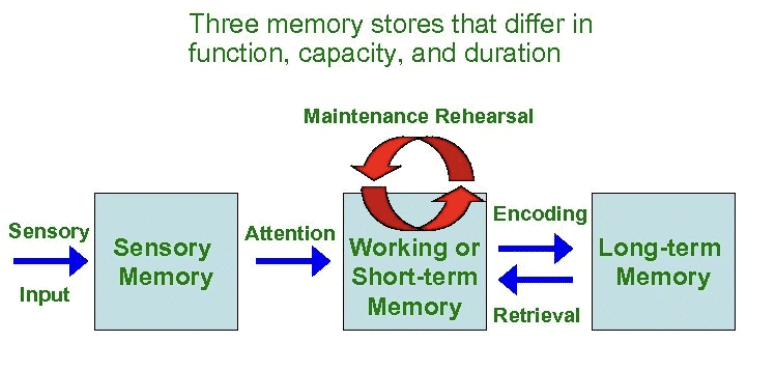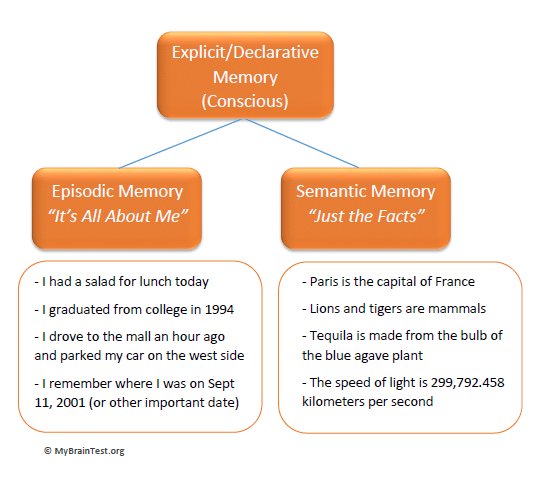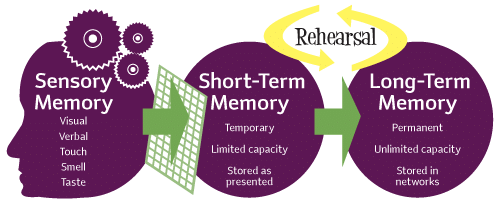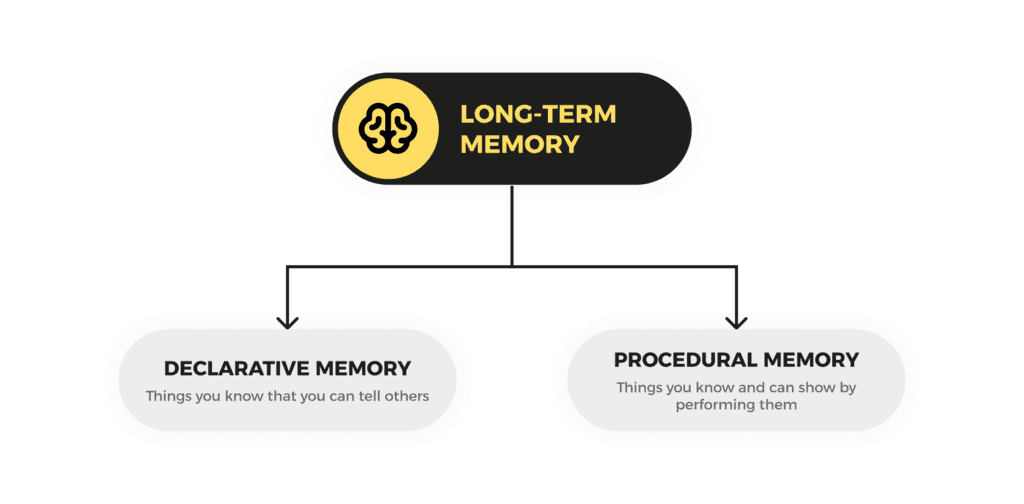Multiple Choice Questions
Q1: Which of the following is the first stage in the memory process?
(a) Storage
(b) Retrieval
(c) Encoding
(d) Repetition
Ans: (c) Encoding
Explanation: Encoding is the first stage, where information is registered and converted into a form that can be processed by the memory system.
Q2: What does thecompare human memory to?
(a) A brain
(b) A computer
(c) A library
(d) A map
Ans: (b) A computer
Explanation: The Stage Model compares human memory to a computer because both systems process, store, and retrieve information.
Q3: Which of the following is an example of short-term memory?
(a) Remembering your best friend's birthday for years
(b) Remembering a phone number temporarily
(c) Remembering the capital of your country
(d) Knowing how to ride a bicycle
Ans: (b) Remembering a phone number temporarily
Explanation: Short-term memory holds information briefly, such as a phone number until it is dialed.
Q4: Which of the following is NOT a method of memory measurement?
(a) Free Recall
(b) Sentence Verification Task
(c) Mnemonics
(d) Priming
Ans: (c) Mnemonics
Explanation: Mnemonics are memory improvement techniques, not measurement methods.
Q5: Which type of long-term memory involves personal life experiences?
(a) Semantic Memory
(b) Procedural Memory
(c) Episodic Memory
(d) Declarative Memory
Ans: (c)
Explanation: Episodic memory contains personal experiences and events in one’s life.
Short Q/A
Q1: What are the three main stages of memory?
Ans: The three main stages of memory are Encoding, Storage, and Retrieval. Encoding refers to the process of recording information, storage refers to retaining the information, and retrieval is bringing the stored information back into awareness.
Q2: Explain the concept of working memory.
Ans: Working memory is a type of short-term memory that holds and manipulates information for cognitive tasks. It includes components like the phonological loop, visuospatial sketchpad, and central executive.
Q3: What is interference theory?
Ans: Interference theory suggests that forgetting occurs because new information interferes with the retrieval of old information, or vice versa.
Q4: How does elaborative rehearsal differ from maintenance rehearsal?
Ans: Elaborative rehearsal involves linking new information to existing knowledge, making it easier to remember, while maintenance rehearsal involves simple repetition of information to retain it temporarily.
Q5: What is the main difference between declarative and procedural memory?
Ans: Declarative memory refers to factual information, like names and dates, while procedural memory involves skills and actions, like riding a bicycle.
Activity-Based Questions
Q1: Try to remember the list of digits in different groupings (e.g., 1947, 1949, 2004). What differences do you observe when recalling the grouped numbers versus individual numbers?
Ans: Grouping digits into meaningful chunks, such as years or significant events (e.g., 1947, 1949, 2004), improves recall because it leverages the brain's ability to organize information into patterns. This process, known as chunking, helps increase the capacity of short-term memory by reducing the cognitive load. When numbers are grouped meaningfully, they are more easily stored and retrieved, compared to recalling individual digits, which requires more effort and attention.
Q2: Write down two events from your early school days and two events from Class XI that you remember vividly. Compare these in terms of length, emotions, and coherence.
Ans: Early School Memories:
Event 1: I vividly remember the first day of school when I felt nervous but excited. I met new friends and was introduced to my teacher, which made me feel special and eager to learn.
Event 2: Another strong memory is winning a small class competition in which I had to recite a poem. The joy and pride I felt at that moment are unforgettable.
Class XI Memories:
Event 1: In Class XI, I vividly recall preparing for and participating in a science project competition. It took weeks of planning, research, and hard work, and I felt a deep sense of accomplishment when it was done.
Event 2: Another memory is the preparation for my first major exam in Class XI. It was stressful, but I felt a sense of relief and pride after completing it.
Comparison:
Length: Early school memories are shorter, often involving brief moments that leave lasting emotional impressions. In contrast, Class XI memories are longer, involving detailed experiences that unfold over days or weeks.
Emotions: The emotions from early school days tend to be more intense, with a mix of excitement, nervousness, and pride. Class XI memories, while still emotional, are more about stress, preparation, and a sense of achievement.
Coherence: Early school memories are more coherent because they involve specific, impactful moments. Class XI memories are less emotionally charged but more coherent in the sense of being part of a larger process, such as project preparation or exam preparation.
Research-Based Question
Q1: Conduct research on different types of memory (e.g., episodic, semantic, procedural) and their importance in daily life. Summarize your findings.
Ans: Students are advised to collect data themselves
Conclusion:
- Episodic memory helps recall personal life events and emotional experiences.
- Semantic memory involves knowledge and facts, such as knowing the capital of a country.
- Procedural memory is essential for learning skills, like riding a bicycle or playing an instrument.
Each type of memory serves a unique function, helping in decision-making, learning, and maintaining personal identity.
Case Study Analysis
Q1: Analyse the Case Study Given below:
Imagine a student who has trouble recalling learned information during an exam, even though they studied extensively the night before. The student is anxious and stressed, leading to poor performance.
Ans: This case illustrates retrieval failure, a common memory problem where a person struggles to access stored information due to insufficient or ineffective retrieval cues. In this scenario, the student studied extensively but could not recall the material during the exam, likely because anxiety and stress prevented the brain from retrieving the information efficiently.
Key Factors:
Anxiety and Stress: High levels of anxiety can interfere with memory retrieval, as stress hormones like cortisol can hinder cognitive functions, including recalling learned information.
Lack of Retrieval Cues: The student might have studied well but lacked specific cues to trigger the recall during the exam, leading to failure in accessing the stored information.
Suggestions for Improvement:
Relaxation Techniques: The student could practice relaxation strategies, such as deep breathing or mindfulness, before and during the exam to reduce stress and improve focus.
Enhanced Study Methods: Instead of cramming, the student could engage in active recall, spaced repetition, and elaborative rehearsal to better encode and retrieve information during exams.
Contextual Cues: The student could create connections or associations with the material while studying (e.g., linking concepts with real-life examples) to improve memory retrieval cues during the exam.
Research Summary
Q1: Summarize a research article on memory improvement techniques, such as the use of mnemonics, and discuss its effectiveness in enhancing memory retention.
Ans: Research on memory improvement highlights various strategies to enhance memory retention, with mnemonics, chunking, and elaborative rehearsal being some of the most effective techniques. These methods work by helping individuals process information more deeply and create stronger associations or mental images.
Mnemonics: These are memory aids that use patterns, acronyms, or rhymes to help recall information. For example, using the acronym PEMDAS to remember the order of operations in mathematics.
Chunking: This technique involves breaking down large amounts of information into smaller, manageable units or "chunks." For example, remembering a long string of numbers as smaller groups (e.g., 123-456-7890).
Elaborative Rehearsal: This involves linking new information to something already known, making the new information more meaningful and easier to remember.
Effectiveness of Mnemonics:Studies show that mnemonics are particularly effective for improving recall, especially for factual information, such as lists, definitions, or steps in a process. They help organize information in a way that is easier to retrieve. Research also supports the idea that these techniques can significantly boost memory performance for tasks that involve factual or procedural knowledge, making them highly useful in educational and professional settings.
In conclusion, the use of memory improvement techniques like mnemonics, chunking, and elaborative rehearsal can greatly enhance memory retention by promoting deeper processing and making information more accessible for recall.


























